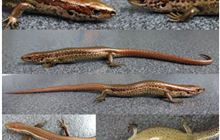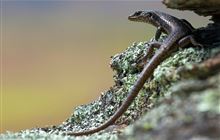Lizard finds in South Westland excite
Archived content: This media release was accurate on the date of publication.
Introduction
DOC rangers on the West Coast have struck gold, with the discovery of two lizard species in the Okarito Sanctuary, near the township of Franz Josef.Date: 25 May 2020
A gecko, identified as the elusive Okarito or broad-cheeked gecko (Mokopirirakau “Okarito”), was last encountered decades ago. Very little is known about it with just a handful of records and sightings over the years.
Te Runanga o Makaawhio Chairman Paul Madgwick welcomed the discovery as an "exciting find" of a taonga species on the brink of extinction.
Rheanne Sullivan, Biodiversity Ranger in South Westland says; "With the species currently classed as 'data deficient’, our focus now is to improve our understanding of its ecology and conservation needs. Finding them is just the beginning.”
This is the second exciting lizard discovery in Okarito in the last year after a Canterbury grass skink was found by a member of the local community predator control programme while out checking traps. It turned out to be an important find and expanded the species’ known range, as it has never previously been recorded as far south on the West Coast as Okarito.
Like many of New Zealand’s native species, introduced predators like rodents, ferrets and weasels, hedgehogs and cats have caused a drastic decline in lizard populations. As lizards are ectothermic (cold-blooded), the cold makes them even more vulnerable as they are simply too slow to escape from introduced mammalian predators.
Despite New Zealand’s reputation for birdlife, it could arguably be known as the land of lizards, as our small country boasts one of the most diverse groups of lizards of any temperate region in the world.
New Zealand has 43 recognised species of gecko, 64 species of skink and a high likelihood of many more to be discovered as genetic identification techniques improve and new species are found in remote areas.
If you see a lizard, especially on the West Coast or in the alpine zone, let your local DOC office know or email lizardresearch@doc.govt.nz. It could be an important discovery!
Background information
The Okarito sanctuary, part of Westlands Tai Poutini National Park, is better known as the home of New Zealand’s rarest species of kiwi, the rowi, and comprises of 20,000 hectares of thick, lowland rainforest. The area has a dramatic glacial history that has had lasting effects on the landscape, and in turn, the species that live there.
When glaciers stretched from the mountains to the sea, the West Coast - in particular - was repeatedly fragmented into refugia (pockets of habitat) where wildlife would survive, trapped between walls of ice. Over time, these isolated species evolved into the genetically distinct populations we see today (i.e. rowi and the neighbouring Haast tokoeka kiwi) and resulting in “explosive diversification”, a significant increase in the number of species present in the area.
The Okarito Community Trapping Programme is a volunteer-run group which receives funding from the Community Conservation Partnerships Fund. Individuals and groups can apply to the fund in order to support community-based conservation projects. Read more about the fund here.
Worldwide, lizards tend to occupy warmer climates, which makes NZ unusual because many of the country’s lizards occupy colder regions like the South Islands alpine zone.
Apart from the introduced plague skink (also known as the rainbow skink, lampropholis delicata) all New Zealand lizards are endemic, found nowhere else in the world. They are relatively long-lived (the Waitaha gecko found in Canterbury can reach 50+ years) and all but one species of skink (the egg-Iaying skink) give birth to live young. They seem to occupy nearly every habitat; from salty tidal coastlines to dense forest to the harsh alpine. Some species are widespread and others extremely picky specialists.
Contact
For media enquiries contact:
Email: media@doc.govt.nz


